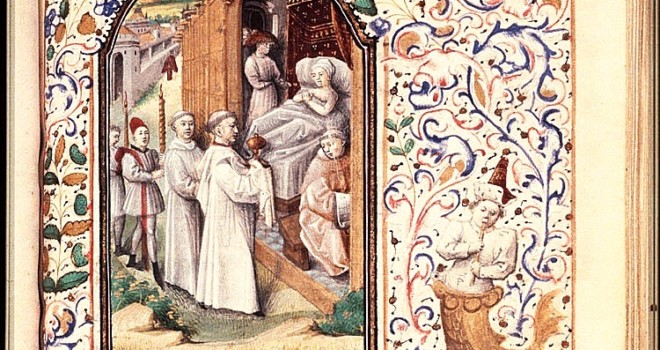It may seem pointless to read a reflection on the Anointing of the Sick by a person who has never received this sacrament. But it also makes sense. Just as the suffering, death, and Resurrection of Christ bought each of us undeserving sinners salvation and eternal life, it is through the graces of this sacrament and the suffering of our brothers and sisters that draws us close to the Sacred Heart of Jesus. There, we are washed in His love, grace, and mercy, even, and especially, in the dark valley and at the hour of death.
Every moment of life is preparation for eternal life, and every encounter with suffering is an opportunity to choose more intimacy with our Savior. As St. Ignatius of Loyola said, “If God gives you an abundant harvest of trials, it is a sign of great holiness which He desires you to attain.”
The fuller, more complete purpose of the Anointing of the Sick is for God to bestow on His faithful grace and strength for their journeys through the sufferings of this life into the eternity of the next. I have observed this lesson intimately in distinct experiences of suffering among my loved ones, from newborn to nearly a hundred years old.
New Life, New Suffering
When I was ten, I first
witnessed the grace, beauty, and power of the Anointing of the Sick without
even being present for it. After at least five years of praying every night for
God to give our family another baby, my brother was born. A mere three weeks
later, I was confused, terrified, and angry when a family trip was cut short by
a frantic drive halfway across the country in a terrifying whirl of medical
uncertainty.
As my sister and I returned home with our grandmother, my parents took our baby brother to the hospital to wait for answers. They watched their son lie restlessly in a cold hospital crib, wires and tubes for an assortment of monitors attached to his tiny body, a cast nearly as large as his torso wrapped around his arm to keep IVs in place. The ultimate diagnosis was a serious stomach condition that required emergency surgery.
In God’s divine
providence, the priest at the hospital that day would many years later become a
beloved pastor at our parish. But right now, he was the vessel of grace for my
parents and brother as he administered the Anointing of the Sick. The grace of
the sacrament in that moment was very much oriented toward giving my brother
strength for treatment, surgery, and ultimately, healing. Afterward, my parents
relayed how the priest anointed so gently the tiny body of my baby brother with
the same sacred oils housed in our own church and offered fervent, loving
prayer to God the Father on behalf of this little child. I saw then the peace
that the sacrament offered my worried, grieving parents: peace to listen
to wise counsel; courage to entrust their
baby to a surgeon; confidence that God loves their son more than they do; peace
and courage to face his divine will, knowing they had done all they could, not
just as medical advocates, but also as spiritual trustees of this uniquely special
life.
My parents’ absolute insistence that my brother be anointed
before surgery laid the foundation in my life to see suffering as spiritual. It
impressed upon me that we should not attempt to suffer alone. It taught me in a
real, tangible way that we truly are body and
soul, perfectly united, and therefore, one cannot suffer or heal in the
body without involving the soul, and vice versa.
Our Earthly Journey
For many of us, God
willing, the sacrament of the Anointing of the Sick will be the final sacrament
(that is, an outward sign of an inward grace) we receive
in our earthly life,
where the supernatural is made present here in the natural world. It is the
bridge between our exit from this world and our entrance into the next. As
such, this powerful sacrament brings beauty, joy, sustenance, and grace to
souls preparing for their final journey.
Of course, today, in
Holy Mother Church’s wisdom and beauty, the graces of this powerful sacrament
are available to the faithful earlier and more readily than ever before. This
is partly a recognition that, in fact, every moment of our earthly lives is a
step on our journey toward our eternal resting place, particularly when we
suffer and as we near the end of our earthly lives. In those times, we are
often tempted to be overwhelmed with fear and confusion. It is a battle to hang
with Christ on the Cross. It is a battle to offer up our suffering for the
redemption and salvation of others. It is a battle to face our mortality and
the reality of eternity. We gain our strength for those battles, however long
or short, simple or difficult they
may be, through the powerful sanctifying grace
of the sacrament of the Anointing of the Sick.
Supernatural Grace
Many of the greatest saints not only embraced suffering as a means to
holiness and intimacy with God but actually asked God to bless them with
opportunities to suffer as a means of attaining grace. St. Gemma Galgani wrote,
“If you really want to love Jesus, first learn to suffer, because suffering
teaches you to love.” Suffering is the great furnace of holiness, for it
empties us of our strength and purges us of our pride, offering us the
opportunity to focus completely on what is most important—the eternal.
Such dying to self requires abundant
grace, and that is where the Anointing of the Sick comes into the picture. To
think that we can endure alone the suffering of physical, emotional,
psychological, or spiritual sickness and pain defeats its redemptive
purpose. No, we must turn to God, relying
on His mercy and strength. We must make a choice to unite not just our
sufferings but also our wills to Christ’s. These are supernatural feats that
require supernatural grace, grace that is available in abundance through the
sacraments of the Church and, in these particular moments, through the
Sacrament of the Anointing of the Sick.
A Summer of Suffering
The summer of 2018
plunged me deep into suffering in a way that made me completely dependent for
strength upon the sacraments. Within a matter of weeks, three family members
received overwhelming medical diagnoses without warning. Each of them, despite
vastly different diagnostic outlooks and outcomes, was fortified by the
powerful sacramental graces poured out to souls in the Anointing of the Sick.
My young, newlywed, newly pregnant sister was diagnosed with melanoma. My dear
aunt languished inexplicably in a hospital for weeks before receiving
the rare fatal diagnosis of
Creutzfeldt-Jakob disease. My beloved, healthy, active father was crippled by
incurable, but treatable, multiple myeloma. The darkness of that intense
season of sorrow was lit only by the candle of our Faith—made real and present
in our strong family bonds, supportive parish community, and life-giving
sacraments administered by good, holy priests.
My sister received both a blessing for her
unborn child, as well as Anointing of the Sick before her successful surgery
to remove the melanoma. Through the confusion of my aunt’s surprising
diagnosis, she was anointed by our parish priest, who ultimately gave both her
and her family the beautiful gift of a private Mass for the dying around her
hospice bed only days before she died. Through months of chemo and an intense
bone marrow transplant, my dad was fortified by monthly reception of the
Anointing of the Sick; his treatment and recovery were remarkably without
complication as he explicitly offered his nearly constant suffering for a
specific personal intention.
Abundant Grace
I have learned in tangible and profound
ways that grace abounds at the bedside of the sick and the dying. It is grace
that heals wounds, restores brokenness, bridges divides, softens hearts, opens
ears, refreshes weary souls, encourages sinners, strengthens faith, kindles
love, and allows miracles. Sometimes, the miracles are physical, but more
often, they are spiritual, emotional, or psychological. And much more often
than we pray for or expect, the miracles are granted not to the suffering or
the dying but to the ones nearby most in need of a miracle.
All of us who are blessed
to walk with someone—a relative, a friend, a patient, even a stranger—through
the valley of the shadow of death are fortified by the abundant and miraculous
graces that Jesus’ Sacred Heart pours out on those who suffer with Him. And
those graces ripple through each of our lives in a thousand ways, large and
small, to the greater glory of God and His kingdom. How very blessed we are!
The beauty of the Sacrament of the Anointing of the Sick has nothing to do with the outcome of the various health battles that my dear loved ones have faced. The beauty is in the strength, grace, and fortitude they received to take up their crosses and carry them, following Christ to Calvary, whether that means death for my aunt, cure for my sister, or remission for my dad. Only when we walk by choice, in faith, with the Savior can suffering be a source of great joy.













